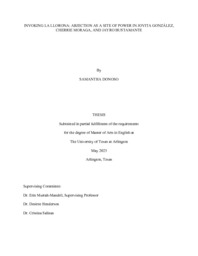
ATTENTION: The works hosted here are being migrated to a new repository that will consolidate resources, improve discoverability, and better show UTA's research impact on the global community. We will update authors as the migration progresses. Please see MavMatrix for more information.
Show simple item record
| dc.contributor.advisor | Murrah-Mandril, Erin | |
| dc.creator | Donoso, Samantha | |
| dc.date.accessioned | 2023-06-14T17:07:16Z | |
| dc.date.available | 2023-06-14T17:07:16Z | |
| dc.date.created | 2023-05 | |
| dc.date.issued | 2023-05-19 | |
| dc.date.submitted | May 2023 | |
| dc.identifier.uri | http://hdl.handle.net/10106/31271 | |
| dc.description.abstract | This thesis seeks to analyze how La Llorona’s abjection allows her and those who call on her to exist as specters, haunting the space of their personal, cultural, or historical trauma to make sense of their abuses and gain power to combat the oppressive structures that allowed for abuse to occur. I include both Historical and Literary contexts to locate La Llorona as a transcultural and hemispheric conduit that provides a space for the feminine collective to find the familiar in the grotesque and carve out a space for themselves in a society that would otherwise force them into silence. I will use this essay to argue how historical and contemporary artists across North and Central America have invoked La Llorona’s abjection to counter the ongoing dominance of colonial, patriarchal power that has forced them into similar subjugated roles across time and space. | |
| dc.format.mimetype | application/pdf | |
| dc.language.iso | en_US | |
| dc.subject | Folklore | |
| dc.subject | Latino folklore | |
| dc.subject | Latino studies | |
| dc.subject | Border studies | |
| dc.subject | Gender studies | |
| dc.subject | La Llorona | |
| dc.title | INVOKING LA LLORONA: ABJECTION AS A SITE OF POWER IN JOVITA GONZÁLEZ, CHERRIE MORAGA, AND JAYRO BUSTAMANTE | |
| dc.type | Thesis | |
| dc.date.updated | 2023-06-14T17:07:16Z | |
| thesis.degree.department | English | |
| thesis.degree.grantor | The University of Texas at Arlington | |
| thesis.degree.level | Masters | |
| thesis.degree.name | Master of Arts in English | |
| dc.type.material | text | |
Files in this item
- Name:
- DONOSO-THESIS-2023.pdf
- Size:
- 314.3Kb
- Format:
- PDF
This item appears in the following Collection(s)
Show simple item record


